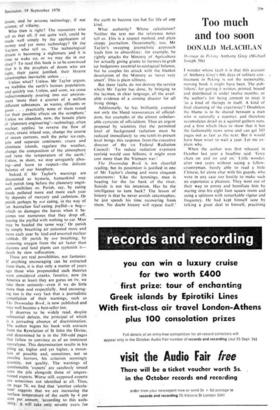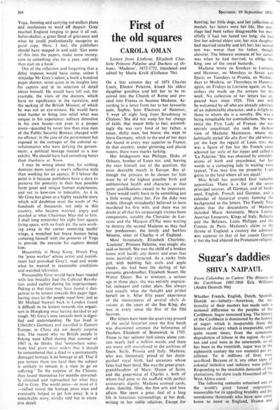Too much and too soon
DONALD McLACHLAN
Hostage in Peking Anthony Grey (Michael Joseph 50s) I wonder whose fault it is that this account of Anthony Grey's 806 days of solitary con- finement in Peking is not the memorable, moving book it might have been. The pub- lishers', for getting it written, printed, bound and distributed in under twelve months; or the author's for being content to treat it 'as a kind of therapy in itself. A kind of final cleansing of the experience'? Doubtless the blame is to be shared between a man who is naturally a reporter, and therefore accumulates detail as a squirrel gathers nuts, and a firm which likes to show that it has the fashionable news sense and can get 343 pages out as fast as the next. But it would have been wiser to wait a year. Let me ex- plain why.
When the author was first released in October last year a headline said: 'Grey chats on and on and on.' Little wonder. after two years without seeing a fellow- countryman, barely able to read a little Chinese, let alone chat with his guards, who were in any case too hostile to make such an experience a pleasure. They went out of their way to annoy and humiliate him by staring into his eight foot square room and using a spittoon with remarkable vigour and frequency. He had kept himself sane by talking a great deal to himself, practising
Yoga, forming and carrying out endless plans and resolutions to ward off despair. Grey reached England longing to pour it all out, helter-skelter, a great flood of grievance and what he could professionally recognise as good copy. Here, I feel, the publishers should have stepped in and said: 'Get some of this into the papers, make some money, turn to something else for a year, and only then start on a book'.
Out of the reflection and forgetting that a delay imposes would have come, unless I misjudge Mr Grey's talent, a book a hundred pages shorter, more acute in its insights into his captors and in its selection of detail about himself. He would have left out, for example, the visits of the doctors, which have no significance in the narrative, and the sacking of the British Mission, of which he was not an eye-witness. He would have tried harder to bring into relief what was unique in his experience: solitary detention in his own house—not even in a proper room—'guarded by never less than nine men of the Public Security Bureau: charged with no offence; in the care of the government but exposed to the outrages of the cultural re- volutionaries who were defying the govern- ment; a political hostage treated as a zoo exhibit. We should have had something better than Darkness at Noon.
I may be wrong about this, for nothing destroys more surely a man's reflective style than _working for an agency. if I labour the point it is because publishers have a duty to preserve for posterity in their best possible form great and unique human experiences, and not to kow-tow to topicality. As it is, Mr Grey has given us a highly readable story which will doubtless meet the needs of the hundreds of thousands, not only in this country, who became worried, angry and puzzled at what Chairman Mao did to him. I shall long remember his eight foot square living space, with no fresh air, the ants work- ing away in the corner removing moths' wings, a wretched but brave human being torturing himself with the postures of Yoga to provide the exercise his captors denied him.
Meanwhile in Hong Kong, Hsueh Ping the 'press worker' whose arrest and punish- ment had provoked Grey's, read and wrote what he wanted in reasonable conditions and watched television.
Presumably Grey would have been treated with less brutality had the Cultural Revolu- tion ended earlier during his imprisonment. Peking at that time may have found it dan- gerous to be lenient towards this paper tiger, having once let the people maul him; just as Mr Michael Stewart back in London found it difficult to be lenient towards riot organi- sers in Hongkong once having decided to act tough. Mr Grey's tone towards both is digni- fied and understanding. He has lived in Ulbricht's Germany and travelled in Eastern Europe, so China did not deeply surprise him. The reason why no British people in Peking were killed during that summer of 1967 is, he thinks, that 'somewhere some- body had given strict orders that it should be remembered that a dead or a permanently damaged hostage is no hostage at all. That if you torture them too hard then the subject is unlikely to remain in a state to go on suffering.' To the surprise of the Chinese, they found themselves for months universal- ly criticised and reproached for what they did to Grey. The world press—or most of it —rallied round the hostage press man and eventually helped to get him away. It is a remarkable story, vividly told but in exces- sive detail.



































 Previous page
Previous page